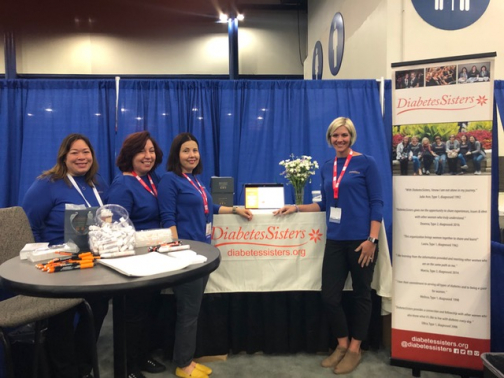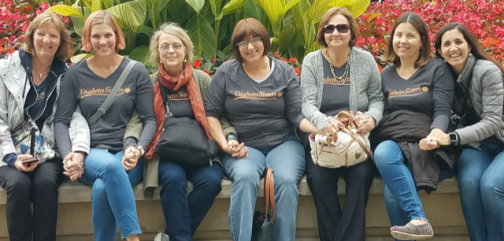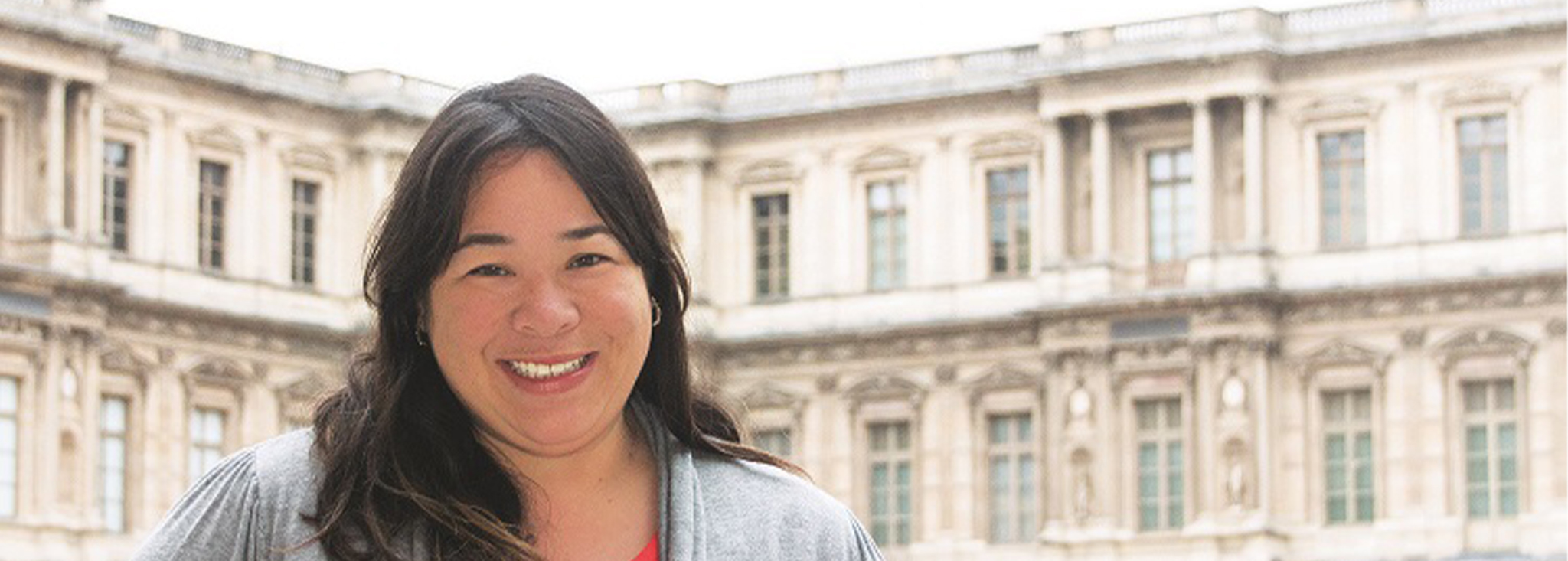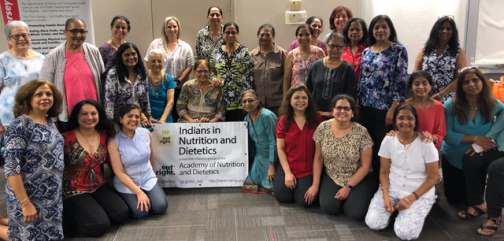Diabetes Sisters CEO Anna Norton on Building Peer Support Through Sisterhood
Anna Norton is the CEO of DiabetesSisters, a non-profit organization dedicated to helping women with all types of diabetes live healthier and fuller lives. The organization offers a range of education on women’s health issues and support services, including online and in-person meetups and programs. Recognizing that emotional and peer support are vital to a woman’s overall wellbeing, DiabetesSisters provides an environment where women can openly share information and their own stories to form meaningful bonds. Norton, who’s been living with type 1 diabetes for over 25 years, talked to Beyond Type 2 about the organization and the importance of peer support among women with diabetes.
How did DiabetesSisters begin?
DiabetesSisters was founded in 2008 by Brandy Barnes who lives with type 1 diabetes and experienced pregnancy with it. It wasn’t necessarily a difficult pregnancy, but it was a lonely, high-risk pregnancy. A couple of years after having her child, she wondered how she could connect women with type 1 who had similar experiences. Brandy jotted some notes and shared them with her husband, who encouraged her to make it happen. Then, she sought women with diabetes in the Triangle Area of North Carolina—Durham, Raleigh and Chapel Hill—who wanted to hang out.
In 2009, the organization was recognized by the IRS as a 501(c)(3) and the following year, partnered with TCOYD, to organize a meetup for women attending their local conference. Dozens of women attended it and from there began our Weekend for Women conference. For years, women have gathered to learn about diabetes from experts and each other.
What made you want to get involved with the organization?
I came across DiabetesSisters in 2011 when I saw a pamphlet about it at my endocrinologist’s office. I saw they were hosting a weekend meetup and I decided to check it out. I was diagnosed with type 1 diabetes in 1993 at 18 and I didn’t know many who lived with it—maybe a handful of older women who were nearing the end of their lives, but no one younger. I went for nearly 20 years without having support. When I went to a DiabetesSisters event, I was worried I wouldn’t feel welcomed because I didn’t do diabetes “the right way” and would be judged for it. Turns out, when I went, I witnessed a level of comfort that made me feel like I was home. People were managing diabetes in the best way that applied to their lives. It was a transformative weekend and I learned new things ranging from the glycemic index to the impact of women’s hormones on blood sugar.
But what I really loved was meeting other women who had lived with diabetes for longer than me. I met a woman who had a 50-year medal from Joslin’s Medalist Program, to celebrate her milestone. She passed it around the table and while holding it, feeling the weight of it was significant to me. I had never thought I could live with diabetes for fifty years. I was always asking myself can I live with diabetes for one more day? After that moment, I determined I wanted a medal, too.
Helping younger women was inspiring, too. I spoke with one who wanted to learn about pregnancy with type 1 diabetes. I shared my experience with her, including feeling isolated and anxious, and afterward, she remarked how my story put her at ease. Just hearing my real experience helped. From there, I decided I wanted to become a volunteer and joined the Weekend for Women planning committee.
How did you become the CEO?
In 2012, DiabetesSisters acquired additional funding that allowed me to join the staff to manage the organization’s operations and some of our in-person programs such as PODS support meetups and the Weekend for Women conference. My background prior was in fundraising and program management. In 2015, Brandy decided to step down from her position as CEO and the board of directors asked me if I would step in temporarily. A couple of months later, I was asked to stay on permanently.
Since then we’ve been able to hire two additional staff so now we’re a staff of three. In the four years that I’ve held this position, we’ve grown our PODS meetup program to 25 states. In 2010, we were only in one state. That year, we also only had 20 PODS leaders, but now we’re up to 60. Our Weekend for Women Conference grew exponentially as well and while we no longer host the conference annually, our last one in 2017 we brought in about 150 attendees, where we partnered with the Diabetes Collective to bring another element of peer support through the Diabetes UnConference. We have also grown our Leadership Institute, which is a smaller conference designed to train and educate our PODS Meetup Leaders each year.
Our minority initiative program meets in six cities across the country, including Miami, where the program is in Spanish. We’ve tailored our digital and written materials for our minority audiences, as well. We recently introduced a new page on our site called Between the Lines, where women are sharing their stories about diabetes and time in range throughout different experiences of their lives such as pregnancy and menopause, and other autoimmune diseases and chronic illnesses. We were just nominated for the Hermes Creative Award for the page, and we received an honorable mention, which shows our work is being recognized outside of the diabetes space.
Are there any areas in the U.S. or internationally that you’d like to see DiabetesSisters expand this in person PODS Meetup
We’ve only hit half of the states so we’d like to hit the other half. We’ve had some groups who have met up in Canada and a couple of global virtual PODS meetups that included women in almost every timezone, and I’d like to see DiabetesSisters continue to grow this way.
During our global conversations, we have heard about access and affordability of insulin, other medications and devices. It is interesting to hear the conversations about the challenges of access and affordability from woman world-wide. Not just in the United States, but in Brazil, the United Kingdom and India.
DiabetesSisters is a woman-focused organization but you have a page For the Misters. Do a lot of men see your organization as a support group as well?
Not so much, no. We have resources about general men’s health because we understand that in order for everything to function well from an emotional standpoint, everyone, including men, has to be healthy. What we have seen is that some of the partners of the women of our organization have always asked for more resources and tools, and how to support the woman in their life that has diabetes.
During our Weekend for Women, we have a track just for the partners where we provide them give them more tips on how to be more prepared in diabetes emergencies. We teach about language and the psychology about diabetes We’ve had sessions where women bring their loved ones and we have also hosted sessions that focus specifically on men’s health.
Can you talk to us about the minority initiative and how it began?
I’m Latina. My family is from Cuba and before my diabetes diagnosis, diabetes was known as “the sugar” and with it, you couldn’t have potatoes or rice. After my diagnosis, I was diagnosed as a young adult—I was eighteen, my family didn’t have a lot of involvement in my diabetes life. I did it all on my own.
Over the years, I educated and talked about a lot of different things but not specific ways of managing diabetes. A couple of years ago I was visiting my family in south Florida, but I didn’t have my personal diabetes manager (PDM), the device to send messages to my insulin pump. While visiting a neighbor, I was offered food but opted for water because I didn’t have access to my insulin. My parents’ neighbor offered his metformin to me because he thought “it brings blood sugar down”. I didn’t want to get into it at the time but I knew people needed better education on how metformin helps keep blood sugar down but doesn’t function the same as insulin.
We made some phone calls and started speaking to different educators about programs we could host to serve minority groups, underserved populations. We just started with the African-American population at a health ministry in Washington, DC. We held that event in April 2016 and 75 women attended. We included a diabetes educator and a general practitioner and asked our audience what they wanted to learn about diabetes. A few women, in particular, came because their doctors diagnosed them with prediabetes and told them to return to their offices in a year without giving them any help. We then expanded the program to also address healthy cooking and misconceptions about diabetes.
In central New Jersey, we have a group of women that are of Indian descent and held an event for Indian-American women to discuss similar topics. Earlier this year, we expanded the program to Chicago and centered it around exercise. We had the opportunity to partner with minority small businesses that have similar values to DiabetesSisters. We reach about 500-600 women through this program. This month we held a program in the Bronx in New York for the first time.
What should the public know about the relationship between women’s health and diabetes?
I think that as women age, we have different transitions in our lives that are significant that not only affect us mentally but also physically. For example, diabetes and menopause are things I don’t think are discussed enough. Another is the care for women with gestational diabetes after they’ve given birth. Just because they’re sent home after having their child doesn’t mean their diabetes goes away. There’s a lack of understanding that a woman who develops gestational diabetes has a higher risk of developing type 2 diabetes within five years after delivery. These are educational voids we’re trying to fill at DiabetesSisters and we’re working with researchers to do it. As women, we sometimes neglect our own health to focus on other important things. We’re learning to take care of ourselves to be on top of our game and help others.
Are there any areas of diversity that we should be exploring?
I’m going to group women and men all together. We’re certainly not doing any justice to our Native American family with diabetes. Diabetes is such a challenge in Native American communities and we don’t talk about it enough. The Asian American community is another one, just because the thresholds for diagnosis for diabetes among Asian Americans is a smaller window. I also loved being at American Association of Diabetes Educators (AADE) this year where we talked a lot about LGBTQ plus communities and diabetes. I think that’s something that we’re going to see more of as we move forward. Another under-represented group is the family unit as a whole, and how diabetes impacts it.
 What are some ways that we can continue to promote peer support and ensure we’re using the right language and making sure that we’re not saying things that are inadvertently offensive or shaming?
What are some ways that we can continue to promote peer support and ensure we’re using the right language and making sure that we’re not saying things that are inadvertently offensive or shaming?
I think that Beyond Type 1 and Beyond Type 2 do a really good job of sharing personal stories, but then validating those stories as well. Our personal stories are the spotlight, but to have validation, to have a professional say “yes, that’s true”. I think that speaks volumes as well.
What are three words that you have for someone who struggles with diabetes?
Adaptability, resilience and education. It doesn’t matter how you live with diabetes, you can live with diabetes the same exact way every single day, and wind up with completely different results each and every day. So I think adaptability is a key component to trying to live with the unpredictability of diabetes. Resiliency for the same reason. You can put forth a lot of effort in diabetes care and wind up with results that you have that you don’t desire. That doesn’t mean that you’re stuck there forever, that just means that you’re stuck there for that moment, or for that day. Education through your peers, clinicians, healthcare providers and your own research. They all tie into your own empowerment.
Tell our audience where they can find DiabetesSisters and how they can get involved.
They can find everything that they need to know on our website, that’s www.DiabetesSisters.org. I encourage everyone to sign up for our newsletter where you can get all of the information about what’s happening every month all over the country in our programs and conferences. If you’re in a location where we have a meetup I would encourage you to reach out and let us know so we can tell you where it is so you can attend. You can meet other women, talk about your successes and your struggles. Follow us on Facebook, Twitter, on Instagram.







